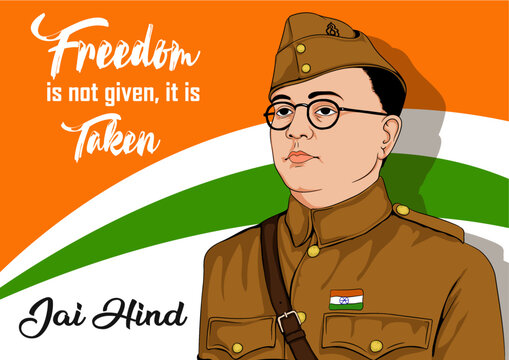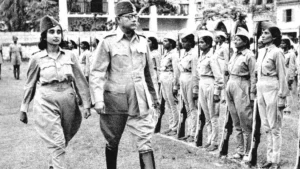Imagine a leader so determined, he defied an empire and built an army from scratch, all for his nation’s freedom. That was Subhas Chandra Bose, a name that echoes courage and sacrifice in India’s history. He stands as a towering figure, a brilliant strategist, and a fierce nationalist who played a crucial part in the fight for independence. His birth and death anniversaries are vital days for national remembrance, honoring his unique contributions. This article will explore his early life, education, political journey, military achievements, and the lasting legacy he left behind.
Early Life and Education
Birth and Family Background
Subhas Chandra Bose was born on January 23, 1897, in Cuttack, a city then part of Orissa, now Odisha. His family was well-known and respected in Bengal. His father, Janakinath Bose, was a successful lawyer. He also served as a member of the Bengal Legislative Council, showing the family’s standing in society. His mother, Prabhavati Devi, nurtured a large family of fourteen children, with Subhas being the ninth.
Education and Intellectual Development
From a young age, Bose showed great academic promise. He excelled in his early schooling, always standing out as a bright student. Later, he attended Presidency College in Calcutta, now Kolkata, and then Scottish Church College. His studies included philosophy and natural science, shaping his sharp mind. At 24, he sat for the highly competitive Indian Civil Service (ICS) exam, ranking fourth. This was a remarkable achievement, but he soon chose a different path. He resigned from the ICS, driven by a growing dislike for British rule and a deep commitment to India’s freedom.
Political Journey and Ideology
Entry into Indian Politics
After leaving the ICS, Bose jumped into the Indian independence movement. He joined the Indian National Congress, finding a mentor in Chittaranjan Das, a prominent nationalist. Bose quickly became active in the Bengal Provincial Congress Committee, eventually serving as its president. His early work involved organizing protests and spreading the message of Swaraj, or self-rule. He faced many challenges, including arrests and imprisonment, which only strengthened his resolve.
Ideological Differences and Leadership
Within the Congress, Bose often had different ideas than Mahatma Gandhi and other leaders. He felt the movement needed a more urgent and forceful approach to achieve independence quickly. Bose believed in direct action and wasn’t afraid to challenge the status quo. His strong leadership led to him being elected as Congress President twice, first in 1938 at Haripura and again in 1939 at Tripuri. However, his radical views caused friction. After stepping down as president, he formed the Forward Bloc within the Congress, pushing for a more aggressive stance against British rule.
World War II and the Indian National Army (INA)
Formation of the INA
As World War II began, Bose saw a chance for India to strike for independence. He believed that British weakness during the war was India’s opportunity. In 1941, he made a daring escape from house arrest in Calcutta, traveling secretly across Afghanistan and Central Asia. His journey took him first to Germany, where he sought support from the Axis powers. Later, he moved to Southeast Asia, a key region for his plans. There, he took charge of the Indian National Army (INA), aiming to fight for India’s independence with Japanese assistance. The INA was largely formed from Indian prisoners of war captured by Japan, eager to join the cause.
Military Campaigns and Significance
The INA, under Bose’s command, became a powerful symbol of armed resistance. Their famous slogan, “Chalo Delhi” (On to Delhi), inspired thousands. The army launched significant military campaigns, including the march towards Imphal and Kohima in India’s northeast. Despite their bravery, the INA faced immense challenges, like harsh weather, limited supplies, and strong Allied defenses. Although they did not achieve their military goals, the INA’s existence and their fight had a profound impact. It showed the world that Indians were ready to fight and die for their freedom, significantly boosting nationalist sentiment back home.
Bose’s Contributions and Legacy
Vision for a Free India
Subhas Chandra Bose had a clear and bold vision for a free India. He imagined a nation that was strong, modern, and united, with no room for religious or social divisions. He strongly believed in industrialization to make India economically self-reliant and powerful. His ideas went beyond just political freedom; he also emphasized social justice and equality for all citizens. He was a forward-thinker who saw India as a leading nation on the global stage.
Enduring Impact and Memorials
Bose remains a symbol of immense courage and unwavering sacrifice for countless Indians. His daring escape and creation of the INA still inspire people today. Subhas Chandra Bose Jayanti, his birth anniversary on January 23rd, is a day of national observance. Across India, memorials, statues, and institutions stand in his honor. His name often comes up in political discussions, showing how deeply his contributions are valued. Historians and leaders continue to study his life, recognizing his vital role in shaping India’s destiny. His actions showed that freedom sometimes needs extreme measures.
The Mystery of His Death
Disappearance and Theories
The circumstances surrounding Subhas Chandra Bose’s death remain one of the biggest mysteries in Indian history. The widely accepted theory states that he died in a plane crash on August 18, 1945, in Taiwan. However, this account has always been met with skepticism. Several inquiries were set up to investigate, including the Shah Nawaz Khan Committee, the Justice G.D. Khosla Commission, and the Mukherjee Commission. These commissions often reached different conclusions, leaving the truth unresolved.
Enduring Questions and Public Perception
The persistent doubts about his death have only added to his legendary status. The public remains fascinated, constantly seeking a definitive answer. This ambiguity has shaped various stories about his life and the ultimate sacrifice he made. People wonder if he survived, if he lived in secret, or if the plane crash was truly the end. The mystery surrounding his disappearance continues to fuel debate, reminding everyone of the enigmatic figure who fought so hard for India’s freedom.
Conclusion
Subhas Chandra Bose was a pivotal figure in India’s freedom struggle, a leader who charted his own path toward independence. His distinct leadership, marked by courage and a radical approach, left an indelible mark on the nation’s history. He dared to challenge the status quo, both within the Congress and against the British Empire, demonstrating an unwavering commitment to self-determination.
Bose’s life reminds us that there are many ways to fight for a cause. His bravery, his vision for a strong India, and his willingness to make the ultimate sacrifice continue to inspire generations. Let us remember his profound impact on the course of Indian history, learning from the diverse approaches that shaped our nation’s journey to freedom.


